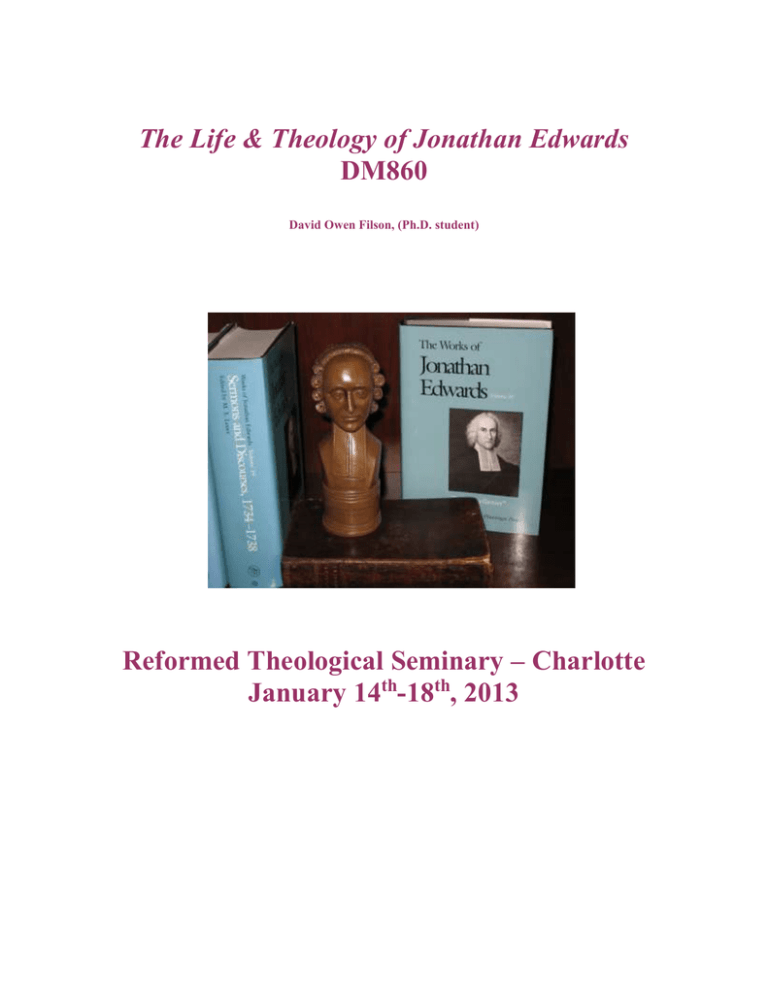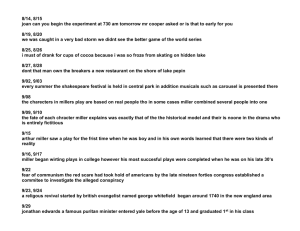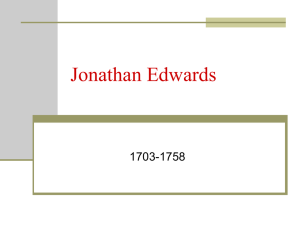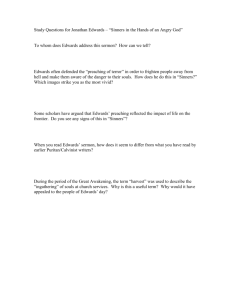The Life & Theology of Jonathan Edwards DM860
advertisement

The Life & Theology of Jonathan Edwards DM860 David Owen Filson, (Ph.D. student) Reformed Theological Seminary – Charlotte January 14th-18th, 2013 The Life & Theology of Jonathan Edwards DM860 David Owen Filson (Ph.D. student) Course Description The Life and Theology of Jonathan Edwards DM860 is a survey of the life and thought of “America’s Augustine,” as he has been called, with special focus upon Edwards’ context and writings. Course Objectives To familiarize students with the life and context of JE To introduce students to the history of Edwards study and historiography To introduce students to the contours of JE’s theology To engage in rigorous historical theological reading, reflection, and analysis To discuss Edwards’ vision of the beauty of God and sweetness and excellencies of Jesus Christ along with the Church’s ways of contemporary multi-cultural engagement in the era of Starbuck’s, i-Phones, and Facebook. To find our own hearts enamored with the “sweet inward sense” the Holy Spirit bring DMin* Student Learning Outcomes In order to measure the success of the DMin curriculum, RTS has defined the following as the intended outcomes of the student learning process. Each course contributes to these overall outcomes. This rubric shows the contribution of this course to the DMin outcomes. Rubric Mini-Justification Strong Moderate Minimal None Biblical/ Theological Foundations: Significant knowledge of biblical and theological foundations for pastoral ministry. (This includes interaction with Biblical texts, as well as awareness of Reformed Theology.) Strong Historical/ Contemporary Practices: Significant knowledge of historical and contemporary practices of pastoral ministry. Strong Integration: Ability to reflect upon and integrate theology and practice, as well as implementation in a contemporary pastoral setting. Strong Sanctification: Demonstrates a love for the Triune God that aids in the student’s sanctification. Strong Student should be equipped to understand and articulate better the theology of Jonathan Edwards, and how his theological program informs, transforms, and reforms pastoral ministry. Student should be equipped to understand and articulate ways in which Jonathan Edwards’ pastoral experience in a trans-Atlantic context has relevance to the past and present of their pastoral experience. Student should particularly focus on the way in which Jonathan Edwards’ Redemptive Historical theology and integrated homiletic impacts their preaching and informs pastoral practice. Student should have a better understanding of Jonathan Edwards’ covenantal/Trinitarian spirituality and be invited to deeper experience of the Triune God. 1 Requirements and Grading 1. Faithful Attendance & Class Participation – As this is only a one-week course, our sessions together are vital to catching the trajectory and intention of the material. If you must miss a class period, please let me know your reasons ahead of time, if possible. To miss a day of class is to miss as many as seven lectures. You are welcome to record my lectures. 2. Reading Reports (30% of grade, due April 30, 2013) – I have carefully selected reading assignments (appr. 2,000 pp.) from the oceanic store of primary and secondary sources on JE. Because of the intentionality behind my selections, it is paramount that you read all of the material. I selected these books, not only for their own merit, but also because they will greatly inform your efforts in preparing for the research paper. Read as a good theological student: humbly, critically, analytically, and with a view toward ST, BT, and PT implications. While the book reports should reflect serious interaction with each book, but also as if you were going to publish them on the church website as recommendations/reviews for each book. 3. Jonathan and Java – We will have in-class discussion of some important JE sermons in light of our call to minister in the post-Christian, postmodern, post-evangelical “Starbuck’s culture” around us. I will assign JE sermons in class. On these class days (Jan 16, 17, 18) please bring a typed, one-page, double-spaced discussion starter paper, which evidences your reading of the assigned sermon via a brief synopsis of the sermon, along with thoughtful comments and questions for analysis and application to the Christian life and ministry situations. There may even be Starbucks coffee on hand to aid our discussion! 4. Research Paper (70% of grade, due April 30, 2013) – Students will research and write a scholarly term paper on one of the following: a. one of JE’s major treatises OR b. a major interpretive/doctrinal topic in JE’s thought. Your paper should be 12-15pp. of solid research and analysis. Less than 12pp. will not be acceptable. Papers are to represent humble, scholarly interaction with primary and secondary sources, arguing and sustaining a thesis, and having a definite, well-conceived conclusion. If you would like help with the format of research paper writing, feel free to peruse some of my essays at www.teachinglikerain.wordpress.com, as examples of what a research paper can look like. Don’t hesitate to call or e-mail me with your questions. You could also read John Frame’s Appendices E&F on the writing of theological papers in The Doctrine of the Knowledge of God. Possible topics: Jonathan Edwards as Redemptive-Historical Theologian – Produce a paper centered on JE’s History of the Work of Redemption, summarizing and analyzing the text of that work in light of various secondary sources pertaining to his proto-Biblical-theological method, tri-world historical, and eschatological views. Jonathan Edwards’ Doctrine of the Covenant – Explore JE’s approach to Covenant Theology, via treaties and sermons. How does he incorporate the pactum salutis? Jonathan Edwards’ Doctrine of the Trinity – Examine particularly vol. 21 of the Yale Edition, JE’s Treatise on Grace & Other Posthumously Published Writings, ed. by Paul Helm, interact with secondary material, and assess JE’s Trinitarian theology in light of catholic doctrine and the way in which this impacts his epistemology. Jonathan Edwards the Preacher – This would focus on representative sermons, as well as related secondary works and articles that give insight into JE’s homiletic. 2 Jonathan Edwards as Calvinistic Theologian – The student would focus upon either Freedom of the Will or Original Sin and other secondary sources, in effort to discuss Edwards’ essential commitment and contribution to the theology of the Reformed tradition. Jonathan Edwards’ Ecclesiology – A paper on this topic would consider JE’s various sermons and treatises related to sacramental practice and other matters of polity practice. Jonathan Edwards and Revival Spirituality – An essay on this topic would examine JE’s revival writings, especially Religious Affections. Term Paper Grading Guidelines: *If possible, your research papers should reference the Yale Edition of the Works of Jonathan Edwards! You may utilize other editions as well, but, if you have access, the majority of references should be Yale. In fact, you may wish to purchase the volume that most applies to your particular paper topic. With that said, if wishes were horses, beggars would ride. These volumes are pricey in hardcover. There are a few volumes in this series available in affordable paperback. If you would like, my wife can tell you some of the most effective ways I have talked her into letting me buy books over the years. Perhaps, this would help your cause. Otherwise, work out something with your fellow Edwardsian students here at RTS, regarding sharing the Yale Edition the library holds. You can also access these volumes digitally at: http://edwards.yale.edu/research/browse. *Your paper will conform to the Chicago Manual of Style, especially in footnotes (bottom of page) and bibliography. Pay attention to your instructor’s in-class comments about the content of footnotes. *You must reference some combination of ten secondary works (books and journal articles, my online essays, etc.). Don’t hesitate to ask me for bibliographical ideas. I am excited to get you excited about the texts and resources. *No less than 12pages, no more than 15pages. *70% of paper grade will rest on content, analysis, thesis, and quality research. 30% of paper grade will be based on style, coherence, clarity, and form. 3 Reading Requirements Ad fontes The Works of Jonathan Edwards, 2vol. Hickman Edition. This set is some of the best money you can spend. Recall Lloyd-Jones down on his knees in that Cardiff bookshop, as though he were a prospector finding gold in his pan. This can also be had in the Banner of Truth reprint. The Hendrickson set is a bit less expensive and also has an introductory essay on the life of JE. OR You can download a PDF file of these two volumes at: http://www.ccel.org/ccel/edwards/works1.html http://www.ccel.org/ccel/edwards/works2.html Even if you want to buy the hardcopy, it is a great idea to go ahead and download these volumes to your hard drive for ready reference. OR If the cost of the 2vol. set is prohibitive for you right now, you could consider Yale University Press’ A Jonathan Edwards Reader, eds. John E. Smith, Harry S. Stout, and Kenneth P. Minkema. In a small package, this will give you selections from many of the texts we will discuss this week. You could then supplement as needed from other sources for JE original source material. Secondary Sources Jonathan Edwards: A Life by George M. Marsden – 4pp. Review Jonathan Edwards and the Ministry of the Word by Douglas A. Sweeney – 2pp. Review The Legacy of Jonathan Edwards, eds. D.G.Hart, Sean Michael Lucas, Stephen Nichols – 2pp. Review God’s Grand Design by Sean Michael Lucas – 2pp. Review Jonathan Edwards and Justification ed. Josh Moody – 2pp. Review Heaven on Earth by Stephen J. Nichols – 2pp. Review Lecture Trajectory Sketch of JE’s Life Sketch of JE Philosophically and Theologically JE as Preacher: Redemptive Historical Hermeneutic and Homiletic JE as Trans-Atlantic Revival Minister Religious Affections Theological Prolegomena Theology Proper Covenant Theology 4 Doctrine of Creation Man, Sin, and the Will Christology Soteriology & Pneumatology Ecclesiology Eschatological Vision of History Heaven and Hell Why We Need JE Today in Our Ministries Today True instruction was in his mouth, and no wrong was found on his lips. He walked with me in peace and uprightness, and he turned many from iniquity. For the lips of a priest should guard knowledge, and people should seek instruction from his mouth, for he is the messenger of the Lord of hosts. (Malachi 2:6-7, ESV) Keep a close watch on yourself and on the teaching. Persist in this, for by so doing you will save both yourself and your hearers. (1Timothy 4:16, ESV) “One handful of marbles is all you get.” The Multifaceted Edwards Theologian Philosopher __________ __________ & __________ Revivalist/Evangelist “Jonathan Edwards was first of all a preacher.” George M. Marsden (author, Jonathan Edwards: A Life) “…prompted by his affective theology, Edwards passionately prepared and proclaimed his message in order to guide his flock to their eternal home.” Richard A. Bailey (author, “Driven by Passion: Jonathan Edwards and the Art of Preaching” in The Legacy of Jonathan Edwards, 64-65. Co-ed. The Salvation of Souls: Nine Previously Unpublished Sermons on the Call of Ministry and the Gospel by Jonathan Edwards) 5 “The profoundest reasoner, and the greatest divine, in my opinion, that America ever produced.” Samuel Davies (1723-61, “Apostle of Virginia” and Edwards’ successor at the College of New Jersey) “He was, in the estimation of the writer, one of the most holy, humble and heavenly-minded men, that the world has seen, since the apostolic age.” Ashbel Green (1762-1848, eighth president of Princeton) “The greatest, wisest, humblest and holiest of uninspired men.” John Collett Ryland (1723-92, Baptist minister and theologian) “ ‘The Freedom of the Will’ by Mr. Edwards is the greatest achievement of the human intellect.” Daniel Webster (1782-1852, Webster’s Dictionary) “He was the greatest of the sons of men.” Robert Hall (1764-1831, Baptist minister and theologian) “Edwards on the Will never was answered and never will be answered.” Dugald Stewart (1753-1828, Scottish philosopher) “One of the acutest and most powerful reasoners.” Edinburgh Review “His gigantic specimen of theological argument is as near to perfection as we may expect any human composition to approach. He unites the sharpness of the scimitar and the strength of the battle-axe.” 6 London Quarterly Review “From the days of Plato there has been no life of more simple and imposing grandeur than that of Jonathan Edwards.” Westminster Review “A Prince among preachers. In our day there is no man who comes within a thousand miles of him…” Lyman Beecher (1775-1863, Presbyterian minister and “New School Calvinist”) “The most gifted man of the eighteenth century, perhaps the most profound thinker in the world.” Hollister’s History of Connecticut “The most original and acute thinker yet produced in America.” Moses Coit Tyler (1835-1900, writer of American intellectual history) “We cannot take leave of Edwards, without testifying the whole extent of the reverence that we bear him. The American divine affords, perhaps, the most wondrous example in modern times, of one who stood richly gifted both in natural and spiritual discernment—and we know not what most to admire in him, whether the deep philosophy that issued from his pen, or the humble and child-like piety that issued from his pulpit... As the philosopher he could discern, and discern truly, between the sterling and the counterfeit in Christianity—still it was as the humble and devoted pastor that Christianity was made, or Christianity was multiplied in his hands.” Thomas Chalmers (1780-1847, Scottish pastor/theologian/mathematician/philosopher; tutor of Robert Candlish and Andrew Bonar; “Chief Scottish Man of His Time”) “Jonathan Edwards changed what I may call the centre of thought in American theological thinking... More than any other man, to Edwards is due the importance which, in American Christianity, is attributed the conscious experience of the penitent sinner, as he passes into the membership of the Invisible Church. ...The man we so often call our greatest American Divine... was indeed inexpressibly great in his intellectual endowment, in his theological achievement, in his continuing influence. He was greatest in his attribute of regnant, permeating, irradiating spirituality. It is at once a present beatitude and an omen of future good that, in these days of pride in wealth and all that wealth means, of pride in the fashion of this world which passeth away, we still in our heart of hearts reserve the highest honor for the great American who lived and moved and had his being in the Universe which is unseen and eternal.” 7 John DeWitt (1842-1923, Professor of Church History at Princeton Seminary, 18881912; “Jonathan Edwards: A Study” in Biblical and Theological Studies: A Commemoration of 100 Years of Princeton Seminary, 130-31.) The Rise of Interest in JE From 1949… Perry Miller (1905-63) to today. “The reasons for this compelling attraction vary widely over time and individual persuasion: some have approached Edwards for religious inspiration, others to exorcize the ghosts of their Puritan forebears; some have come to appreciate true virtue, others to understand the reality of total evil; some have discovered a great anachronism, others a prophet of modernity.” Harry Stout in Jonathan Edwards and the American Experience, eds. Nathan O. Hatch & Harry S. Stout, 3. Why are you taking a course on Edwards? You need a traveling companion! Let’s listen to John Piper and Tim Keller on the impact of Edwards on life and ministry… 8 “His leaf did not whither, for his roots were in the waters. It was here, too, that he began to study so closely the works of Jonathan Edwards, - reckoning them a mine to be wrought, and if wrought, sure to repay the toil.” (Andrew Bonar, The Memoir and Remains of Robert Murray M’Cheyne, 35) 1813-43 “The necessity of constant study for the work of the ministry remained one of Dr. Lloyd-Jones’ deepest convictions and was one of the main features of his own daily living. Next to his Bible it was probably Jonathan Edwards’ Works which provided the greatest stimulus to him at this date. While still in London he had asked a Welsh Presbyterian Minister for the name of books which would help him prepare for the ministry. One recommendation he received was Protestant Thought Before Kant, written by A.C. McGiffert. Although the 1899-1981 book did not live up to his expectation, while reading it he came across the name of Jonathan Edwards for the first time. His interest aroused, Dr. Lloyd-Jones relates: ‘I then questioned my ministerial adviser on Edwards, but he knew nothing about him. After much searching I at length called at John Evans’ bookshop in Cardiff in 1929, having time available as I waited for a train. There, down on my knees in my overcoat in a corner of the shop, I found the two-volume 1834 edition of Edwards which I bought for five shillings. I devoured these volumes and literally just read and read them. It is certainly true that they helped me more than anything else.’” (D. Martyn Lloyd-Jones: The First Forty Years 1899-1939, 253-54) Class Hours Mon – Fri, Jan 14th – 18th, 2013, 9:00am-4:30pm Office Hours Professor will gladly meet with students during breaks, lunch periods, and after classes. Please see me if you would like to set up a meeting time. I look forward to interacting with and getting to know you. Connect! E-mail: davidlovesdiane@mac.com www.teachinglikerain.wordpress.com http://twitter.com/davidowenfilson http://www.facebook.com/profile.php?id=1193050120 Phone: 615-828-1517 (cell) 9 10


